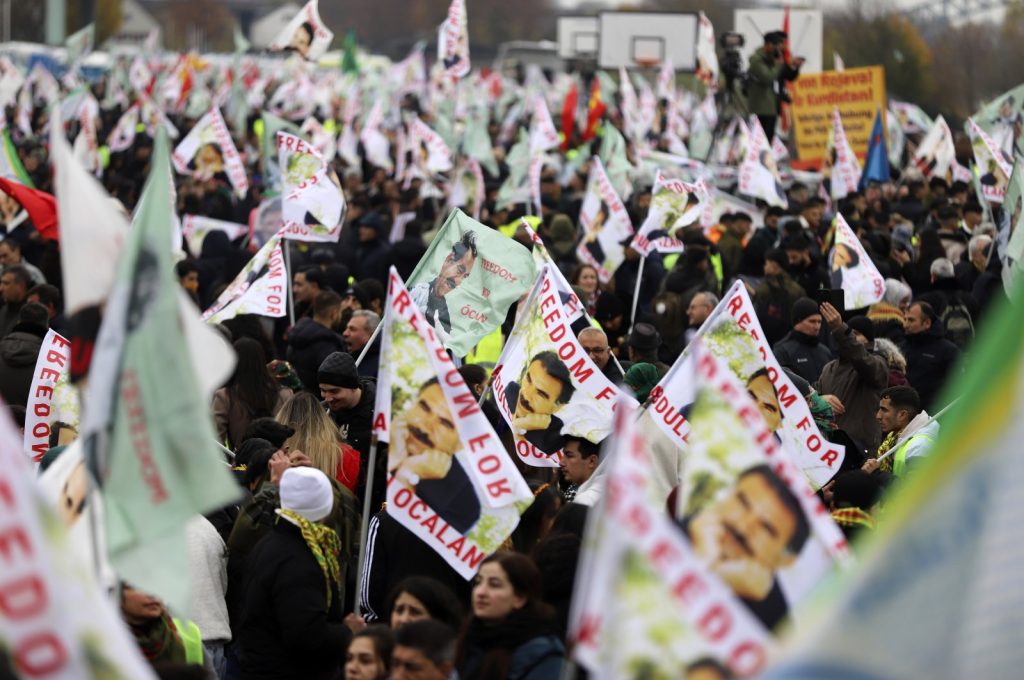Thousands of supporters of the PKK terrorist group took to the streets on Saturday in Germany’s Cologne, calling for the release of its jailed leader Abdullah Öcalan. Although North Rhine-Westphalia has a ban in place for posters of Öcalan, the crowd freely waved them as the police watched. Cologne police said no incidents took place during the march but they intervened twice to remove “symbols that could have a link to the PKK.”
The march comes a few days after Justice Minister Yılmaz Tunç called on Germany to maintain close cooperation with Türkiye in the fight against terrorist groups, including the PKK, during a meeting with German Ambassador Sibylle Katharina Sorg in the capital Ankara.
Earlier this year, the Higher Administrative Court in North Rhine-Westphalia where Cologne is located turned down a complaint filed by a PKK-linked group, which claimed that the police’s prohibition of Öcalan posters during their meeting was illegal. The court underlined that the PKK is classified as a terrorist organization by the European Union and is banned from operating in Germany, and therefore the images of its leader Öcalan were not allowed to be used in certain meetings, to counter terrorist propaganda.
“Images of Abdullah Öcalan have an identifying function for the PKK,” the court stressed in its ruling, adding that Germany’s laws allow for prohibiting the public display of flags and badges, as well as images of people that are associated with a banned organization. “The decisive factor is whether the association uses a symbol or image to identify itself and its purposes,” the court said.
“Such a ‘cult of personality’ exists in the PKK around Öcalan, in that the PKK continues to place him in the foreground as a leader and person of identification for itself and its goals.” The court said the PKK was using various Öcalan posters for propaganda purposes, and in some of them, the terrorist leader was portrayed as a “fatherly, caring and peace-loving leader” to draw support from a wider group of people.
The PKK, classified as an “ethno-nationalist” terrorist organization by the EU’s law enforcement agency Europol, has been banned in Germany since 1993. However, it remains the largest foreign extremist group in the country, and its followers, some 14,500 people, can carry out violent attacks upon instructions from group leaders abroad, Germany’s domestic intelligence agency, BfV, warned in its annual report in 2022. The terrorist group raised an estimated 16.7 million euros ($17.8 million) in Germany in 2021 and collected more than 30 million euros in various “fundraising campaigns” across Europe, according to the report. Furthermore, it showed that since 2013, at least 295 foreign fighters from Germany have traveled to northern Syria and Iraq, where they received military training from PKK terrorists and took part in armed attacks in the region.
In 2017, Germany’s Interior Ministry updated its list of prohibited symbols used by the PKK, and added Öcalan’s image to the list, after an investigation into the propaganda activities of the group. Türkiye has long urged its NATO ally Germany to take stronger action against the PKK, emphasizing that the terrorist group uses the country as a platform for recruitment, propaganda and fundraising activities. Ankara is also concerned the group, which has been responsible for the deaths of some 40,000 people in its more than 40-year terror campaign against Türkiye, is shown tolerance across other European countries. PKK sympathizers and affiliated political groups often hold rallies and engage in recruitment activities in Germany, France, Sweden and other countries. Several reports from Turkish and international law enforcement agencies have shown the group can finance its bloody terrorist campaign through drug trafficking in the EU, raking in over $1.5 billion annually.
Europol’s “EU Terrorism Situation & Trend Report” also revealed that the group maintained “an apparatus that provided logistical and financial support to its operatives in Türkiye and neighboring countries, and promoted its political objectives.” This apparatus mainly operated under the guise of legally recognized entities, such as Kurdish associations, it added.


